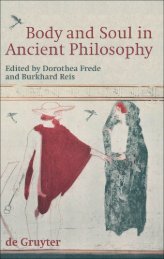Empedocles Redivivus: Poetry and Analogy in Lucretius
Empedocles Redivivus: Poetry and Analogy in Lucretius
Empedocles Redivivus: Poetry and Analogy in Lucretius
Create successful ePaper yourself
Turn your PDF publications into a flip-book with our unique Google optimized e-Paper software.
Introduction 25<br />
As Clay astutely observes, here <strong>Lucretius</strong> develops <strong>in</strong>to an elaborate simile<br />
the metaphor which was latent <strong>in</strong> Epicurus’ expression ἴχνευσις τοῦ ἀδήλου<br />
(cf. Ep. Pyth. 96). 108 In addition, <strong>Lucretius</strong> does not describe just a vague<br />
process of conquer<strong>in</strong>g knowledge. He rather grants his comparison a specific<br />
programmatic function s<strong>in</strong>ce he br<strong>in</strong>gs up essential po<strong>in</strong>ts of his scientific<br />
method, such as its rational character <strong>and</strong> the value of empirical evidence<br />
(1.402–403), with the aid of which we gradually derive <strong>in</strong>formation about<br />
the <strong>in</strong>visible world through the process of σημείωσις. 109 This pattern of<br />
“hunt<strong>in</strong>g,” or the “venatic” paradigm for <strong>in</strong>vestigation, to use Fowler’s term,<br />
centred on the image of vestigia, is applied throughout the poem. 110<br />
It has long been observed that this simile is h<strong>in</strong>ted at <strong>in</strong> <strong>Empedocles</strong>’<br />
B101 which refers to dogs “track<strong>in</strong>g with nostrils fragments of animal bodies<br />
(which they) left from their paws on the soft grass” (κέρματα θηρείων μελέων<br />
μυκτῆρσιν ἐρευνῶν, / . . . ἀπέλειπε ποδῶν ἁπαλῇ περὶ ποίῃ . . . ). 111 Even<br />
more notably, <strong>Lucretius</strong> is the first extant Lat<strong>in</strong> author to employ the compound<br />
adjective montivagus. It is thus highly probable that he <strong>in</strong>vents it <strong>in</strong><br />
order to translate the correspond<strong>in</strong>g Greek compound adjective ὀρίπλαγκτος<br />
which was also an Empedoclean co<strong>in</strong>age (θηρῶν ὀριπλάγκτων, fr. a (ii) 26<br />
M&P) <strong>and</strong> may have been used <strong>in</strong> the broader context of B101. 112<br />
It seems very plausible to suggest that, by means of such a clear allusion<br />
to <strong>Empedocles</strong> with<strong>in</strong> the framework of this key simile regard<strong>in</strong>g his scientific<br />
methodology, <strong>Lucretius</strong> makes tangible the focal <strong>in</strong>tertextual source, to<br />
which he is about to resort systematically. In other words, <strong>Lucretius</strong> proclaims<br />
here that, <strong>in</strong> expound<strong>in</strong>g the Epicurean philosophical system <strong>and</strong> analyz<strong>in</strong>g<br />
fundamental concepts of the imperceptible world, he will use <strong>Empedocles</strong><br />
not only as a poetic model, but also as a scientific one. And <strong>in</strong> fact, thanks<br />
to the partial overlapp<strong>in</strong>g of their philosophical precepts, <strong>Lucretius</strong> can draw<br />
from his predecessor a whole series of techniques which he then creatively<br />
appropriates as an organic component of his poem. Elsewhere, he <strong>in</strong>evitably<br />
deviates from <strong>Empedocles</strong>’ literary means of thought <strong>and</strong> subord<strong>in</strong>ates them<br />
to his didactic purposes <strong>and</strong> to Epicurean tenets.<br />
1.3 EMPEDOCLES, ENNIUS AND LUCRETIUS<br />
In his article “Philosophy <strong>and</strong> Literature <strong>in</strong> Lucretian Intertextuality,” Don<br />
Fowler stresses the fact that “<strong>in</strong> consider<strong>in</strong>g literary <strong>in</strong>tertextuality, we should<br />
certa<strong>in</strong>ly return to the orig<strong>in</strong>al texts for our comparison <strong>and</strong> contrast, because<br />
this will often suggest traces present <strong>in</strong> our target-text under erasure, but we<br />
should also consider the way <strong>in</strong> which these literary texts may have already<br />
been used with<strong>in</strong> the context of philosophical discourse, <strong>and</strong> how they may






![[Niall_Livingstone]_A_Commentary_on_Isocrates'_Busiris](https://img.yumpu.com/51449110/1/163x260/niall-livingstone-a-commentary-on-isocrates-busiris.jpg?quality=85)

![[Richard_Sorabji]_Self__Ancient_and_Modern_Insigh(BookFi.org)](https://img.yumpu.com/30857691/1/174x260/richard-sorabji-self-ancient-and-modern-insighbookfiorg.jpg?quality=85)




